Harding High School
Class of 1966
Famouse People Lost 1966
Some Famous People we Lost in 1966
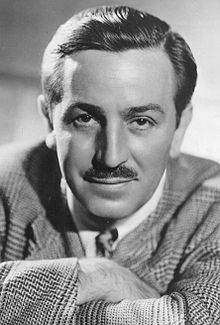 Walt Disney, Walter Elias "Walt" Disney (December 5, 1901 – December 15, 1966) was an American entrepreneur, cartoonist, animator, voice actor, and film producer. He was a prominent figure within the American animation industry and throughout the world, and is regarded as a cultural icon, known for his influence and contributions to entertainment during the 20th century. As a Hollywood business mogul, he and his brother Roy O. Disney co-founded The Walt Disney Company.
Walt Disney, Walter Elias "Walt" Disney (December 5, 1901 – December 15, 1966) was an American entrepreneur, cartoonist, animator, voice actor, and film producer. He was a prominent figure within the American animation industry and throughout the world, and is regarded as a cultural icon, known for his influence and contributions to entertainment during the 20th century. As a Hollywood business mogul, he and his brother Roy O. Disney co-founded The Walt Disney Company.
.jpg) Charles Whitman, Charles Joseph Whitman (June 24, 1941 – August 1, 1966) was an American engineering student at the University of Texas, former U.S. Marine, and a mass murderer who killed 16 people.
Charles Whitman, Charles Joseph Whitman (June 24, 1941 – August 1, 1966) was an American engineering student at the University of Texas, former U.S. Marine, and a mass murderer who killed 16 people.
In the early morning hours of August 1, 1966, Whitman murdered his wife and mother in their homes. Later that day, he brought a number of guns, including rifles, a shotgun, and handguns, to the campus of the University of Texas at Austin where, over an approximate 90- to 95-minute period, he killed 12 people and wounded 32 others in a mass shooting in and around the Tower. Whitman shot and killed three people inside the university's tower and eleven others after firing at random from the 28th-floor observation deck of the Main Building. Whitman was shot and killed by Austin police officer Houston McCoy.
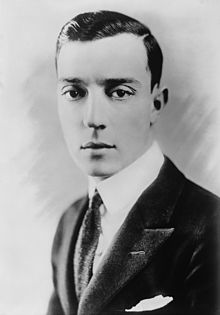 Buster Keaton, Joseph Frank "Buster" Keaton (October 4, 1895 – February 1, 1966) was an American actor, director, producer, writer, and stunt performer. He was best known for his silent films, in which his trademark was physical comedy with a consistently stoic, deadpan expression, earning him the nickname "The Great Stone Face". Keaton was recognized as the seventh-greatest film director by Entertainment Weekly. In 1999, the American Film Institute ranked Keaton the 21st greatest male star of Classic Hollywood Cinema. Critic Roger Ebert wrote of Keaton's "extraordinary period from 1920 to 1929, [when] he worked without interruption on a series of films that make him, arguably, the greatest actor-director in the history of the movies".
Buster Keaton, Joseph Frank "Buster" Keaton (October 4, 1895 – February 1, 1966) was an American actor, director, producer, writer, and stunt performer. He was best known for his silent films, in which his trademark was physical comedy with a consistently stoic, deadpan expression, earning him the nickname "The Great Stone Face". Keaton was recognized as the seventh-greatest film director by Entertainment Weekly. In 1999, the American Film Institute ranked Keaton the 21st greatest male star of Classic Hollywood Cinema. Critic Roger Ebert wrote of Keaton's "extraordinary period from 1920 to 1929, [when] he worked without interruption on a series of films that make him, arguably, the greatest actor-director in the history of the movies".
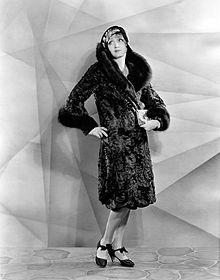 Hedda Hopper (May 2, 1885 – February 1, 1966) was an American actress and one of America's best-known gossip columnists, notorious for feuding with her arch-rival Louella Parsons. She had been a moderately successful actress of stage and screen for years before being offered the chance to write the column Hedda Hopper's Hollywood for the Los Angeles Times in 1938. In the McCarthy era she named suspected Communists. Hopper continued to write gossip to the end, her work appearing in many magazines and later on radio.
Hedda Hopper (May 2, 1885 – February 1, 1966) was an American actress and one of America's best-known gossip columnists, notorious for feuding with her arch-rival Louella Parsons. She had been a moderately successful actress of stage and screen for years before being offered the chance to write the column Hedda Hopper's Hollywood for the Los Angeles Times in 1938. In the McCarthy era she named suspected Communists. Hopper continued to write gossip to the end, her work appearing in many magazines and later on radio.
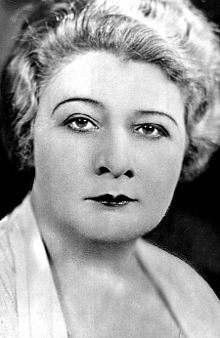 Sophie Tucker (January 13, 1887 – February 9, 1966) was a Ukrainian-born American singer, comedian, actress, and radio personality. Known for her stentorian delivery of comical and risqué songs, she was one of the most popular entertainers in America during the first half of the 20th century. She was widely known by the nickname "The Last of the Red Hot Mamas
Sophie Tucker (January 13, 1887 – February 9, 1966) was a Ukrainian-born American singer, comedian, actress, and radio personality. Known for her stentorian delivery of comical and risqué songs, she was one of the most popular entertainers in America during the first half of the 20th century. She was widely known by the nickname "The Last of the Red Hot Mamas
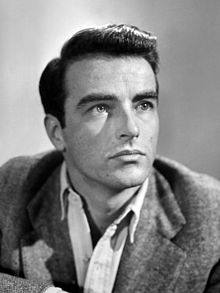 Montgomery Clift , Edward Montgomery "Monty" Clift (October 17, 1920 – July 23, 1966) was an American film and stage actor. The New York Times’ obituary of Clift noted his portrayal of "moody, sensitive young men". He often played outsiders and "victim-heroes", Clift received four Academy Award nominations during his career, three for Best Actor and one for Best Supporting Actor.
Montgomery Clift , Edward Montgomery "Monty" Clift (October 17, 1920 – July 23, 1966) was an American film and stage actor. The New York Times’ obituary of Clift noted his portrayal of "moody, sensitive young men". He often played outsiders and "victim-heroes", Clift received four Academy Award nominations during his career, three for Best Actor and one for Best Supporting Actor.
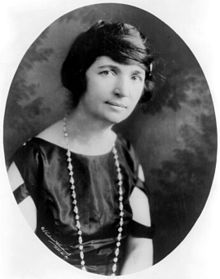 Margaret Sanger (born Margaret Louise Higgins, September 14, 1879 – September 6, 1966, also known as Margaret Sanger Slee) was an American birth control activist, sex educator, writer, and nurse. Sanger popularized the term "birth control", opened the first birth control clinic in the United States, and established organizations that evolved into the Planned Parenthood Federation of America.
Margaret Sanger (born Margaret Louise Higgins, September 14, 1879 – September 6, 1966, also known as Margaret Sanger Slee) was an American birth control activist, sex educator, writer, and nurse. Sanger popularized the term "birth control", opened the first birth control clinic in the United States, and established organizations that evolved into the Planned Parenthood Federation of America.
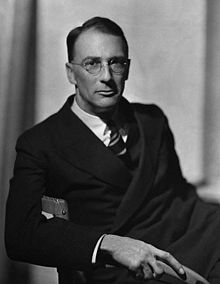 C. S. Forester, Cecil Louis Troughton Smith (27 August 1899 – 2 April 1966), known by his pen name Cecil Scott "C. S." Forester, was an English novelist known for writing tales of naval warfare such as the 12-book Horatio Hornblower series, depicting a Royal Navy officer during the Napoleonic wars. His other works include The African Queen (1935; filmed in 1951 by John Huston), as well as A Ship of the Line and Flying Colours, which were jointly awarded the James Tait Black Memorial Prize for fiction in 1938.
C. S. Forester, Cecil Louis Troughton Smith (27 August 1899 – 2 April 1966), known by his pen name Cecil Scott "C. S." Forester, was an English novelist known for writing tales of naval warfare such as the 12-book Horatio Hornblower series, depicting a Royal Navy officer during the Napoleonic wars. His other works include The African Queen (1935; filmed in 1951 by John Huston), as well as A Ship of the Line and Flying Colours, which were jointly awarded the James Tait Black Memorial Prize for fiction in 1938.
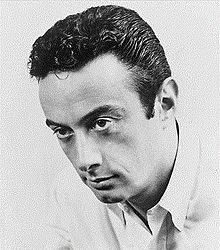 Lenny Bruce, Leonard Alfred Schneider (October 13, 1925 – August 3, 1966), better known by his stage name Lenny Bruce, was an American stand-up comedian, social critic, satirist, and screenwriter. He was renowned for his open, free-style and critical form of comedy which integrated satire, politics, religion, sex, and vulgarity. His 1964 conviction in an obscenity trial was followed by a posthumous pardon, the first in New York State history, by then-Governor George Pataki in 2003. He paved the way for future outspoken counterculture-era comedians, and his trial for obscenity is seen as a landmark for freedom of speech in the United States.
Lenny Bruce, Leonard Alfred Schneider (October 13, 1925 – August 3, 1966), better known by his stage name Lenny Bruce, was an American stand-up comedian, social critic, satirist, and screenwriter. He was renowned for his open, free-style and critical form of comedy which integrated satire, politics, religion, sex, and vulgarity. His 1964 conviction in an obscenity trial was followed by a posthumous pardon, the first in New York State history, by then-Governor George Pataki in 2003. He paved the way for future outspoken counterculture-era comedians, and his trial for obscenity is seen as a landmark for freedom of speech in the United States.
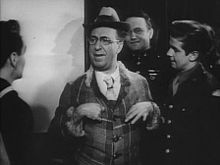 Ed Wynn (born Isaiah Edwin Leopold on November 9, 1886 – June 19, 1966) was an American comedian and actor noted for his Perfect Fool comedy character, his pioneering radio show of the 1930s, and his later career as a dramatic actor
Ed Wynn (born Isaiah Edwin Leopold on November 9, 1886 – June 19, 1966) was an American comedian and actor noted for his Perfect Fool comedy character, his pioneering radio show of the 1930s, and his later career as a dramatic actor
Wynn began his career in vaudeville in 1903 and was a star of the Ziegfeld Follies starting in 1914. During The Follies of 1915, W. C. Fields allegedly caught Wynn mugging for the audience under the table during his "Pool Room" routine and knocked him unconscious with his cue. Wynn wrote, directed, and produced many Broadway shows in the subsequent decades, and was known for his silly costumes and props as well as for the giggly, wavering voice he developed for the 1921 musical review, The Perfect Fool.
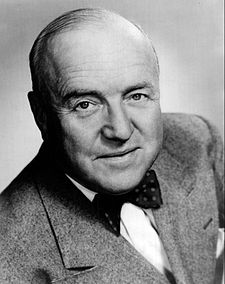 William Frawley, William Clement Frawley (February 26, 1887 – March 3, 1966) was an American stage entertainer, screen and television actor. Although Frawley appeared in over 100 films, he is best known for his television work, playing landlord Fred Mertz in the long-running situation comedy I Love Lucy and "Bub" in another TV comedy series, My Three Sons.
William Frawley, William Clement Frawley (February 26, 1887 – March 3, 1966) was an American stage entertainer, screen and television actor. Although Frawley appeared in over 100 films, he is best known for his television work, playing landlord Fred Mertz in the long-running situation comedy I Love Lucy and "Bub" in another TV comedy series, My Three Sons.
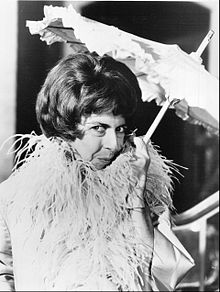 Alice Pearce (October 16, 1917 – March 3, 1966) was an American actress. She was brought to Hollywood by Gene Kelly to reprise her Broadway performance in the film version of On the Town (1949). Pearce played comedic supporting roles in several films, before being cast as nosy neighbor Gladys Kravitz in the television sitcom Bewitched in 1964. She won the Primetime Emmy Award for Outstanding Supporting Actress in a Comedy Series posthumously after the second season of the series. She died from ovarian cancer in 1966.
Alice Pearce (October 16, 1917 – March 3, 1966) was an American actress. She was brought to Hollywood by Gene Kelly to reprise her Broadway performance in the film version of On the Town (1949). Pearce played comedic supporting roles in several films, before being cast as nosy neighbor Gladys Kravitz in the television sitcom Bewitched in 1964. She won the Primetime Emmy Award for Outstanding Supporting Actress in a Comedy Series posthumously after the second season of the series. She died from ovarian cancer in 1966.
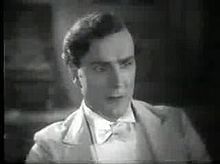 Frank Merrill (born Otto Poll in Newark, New Jersey) (March 21, 1893 - February 12, 1966) was a Southern California and national title-winning gymnast (with over 58 titles to his credit), police officer, stuntman and actor, most famous for being the fifth actor to portray Tarzan on film.
Frank Merrill (born Otto Poll in Newark, New Jersey) (March 21, 1893 - February 12, 1966) was a Southern California and national title-winning gymnast (with over 58 titles to his credit), police officer, stuntman and actor, most famous for being the fifth actor to portray Tarzan on film.
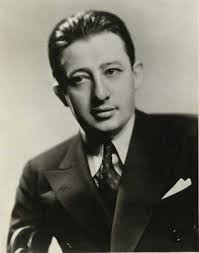 Billy Rose, William "Billy" Rose (September 6, 1899 – February 10, 1966) was an American impresario, theatrical showman and lyricist. He is credited with many famous songs, notably "Me and My Shadow" (1927), "Without A Song" (1929), "It Happened in Monterrey" (1930) and "It's Only a Paper Moon" (1933). For decades preceding and immediately after the Second World War Billy Rose was a major force in entertainment, with shows, such as Jumbo (1935), Billy Rose's Aquacade, and Carmen Jones (1943), his Diamond Horseshoe nightclub, and the Ziegfeld Theatre influencing the careers of many stars. Billy Rose was inducted as a member of the Songwriter's Hall of Fame. After divorcing comedian Fanny Brice, he married Olympic swimmer Eleanor Holm.
Billy Rose, William "Billy" Rose (September 6, 1899 – February 10, 1966) was an American impresario, theatrical showman and lyricist. He is credited with many famous songs, notably "Me and My Shadow" (1927), "Without A Song" (1929), "It Happened in Monterrey" (1930) and "It's Only a Paper Moon" (1933). For decades preceding and immediately after the Second World War Billy Rose was a major force in entertainment, with shows, such as Jumbo (1935), Billy Rose's Aquacade, and Carmen Jones (1943), his Diamond Horseshoe nightclub, and the Ziegfeld Theatre influencing the careers of many stars. Billy Rose was inducted as a member of the Songwriter's Hall of Fame. After divorcing comedian Fanny Brice, he married Olympic swimmer Eleanor Holm.
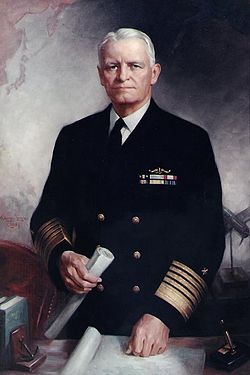 Chester W Nimitz, Chester William Nimitz (February 24, 1885 – February 20, 1966) was a fleet admiral of the United States Navy. He played a major role in the naval history of World War II as Commander in Chief, United States Pacific Fleet (CinCPac), for U.S. naval forces and Commander in Chief, Pacific Ocean Areas (CinCPOA), for U.S. and Allied air, land, and sea forces during World War II.
Chester W Nimitz, Chester William Nimitz (February 24, 1885 – February 20, 1966) was a fleet admiral of the United States Navy. He played a major role in the naval history of World War II as Commander in Chief, United States Pacific Fleet (CinCPac), for U.S. naval forces and Commander in Chief, Pacific Ocean Areas (CinCPOA), for U.S. and Allied air, land, and sea forces during World War II.
Nimitz was the leading U.S. Navy authority on submarines. Qualified in submarines during his early years, he later oversaw the conversion of these vessels' propulsion from gasoline to diesel, and then later was key in acquiring approval to build the world's first nuclear-powered submarine, USS Nautilus, whose propulsion system later completely superseded diesel-powered submarines in the U.S. The chief of the Navy's Bureau of Navigation in 1939, Nimitz served as Chief of Naval Operations (CNO) from 1945 until 1947. He was the United States' last surviving officer who served in the rank of fleet admiral.
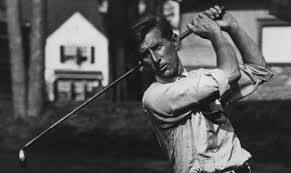 Jim Barnes, James Martin "Jim" Barnes (April 8, 1886 – May 24, 1966) was a leading figure in the early years of professional golf in the United States.
Jim Barnes, James Martin "Jim" Barnes (April 8, 1886 – May 24, 1966) was a leading figure in the early years of professional golf in the United States.
Barnes was one of the most prolific tournament winners of the first few seasons of the PGA Tour, which was also founded in 1916. He won 21 times on the tour in total. He led the tournament winners list in four seasons: 1916 with three, 1917 with two (shared with Mike Brady), 1919 with five and 1921 with four. In 1940, Barnes was honored as one of the 12 golfers to be inducted in the PGA's inaugural Hall of Fame. Later he was inducted into the World Golf Hall of Fame in 1989.
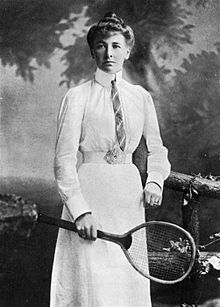 Charlotte Cooper (Charlotte Reinagle Cooper, 22 September 1870 – 10 October 1966) was an English female tennis player who won five singles titles at the Wimbledon Championships and in 1900 became the first female Olympic champion.
Charlotte Cooper (Charlotte Reinagle Cooper, 22 September 1870 – 10 October 1966) was an English female tennis player who won five singles titles at the Wimbledon Championships and in 1900 became the first female Olympic champion.
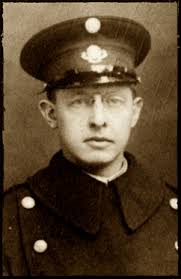 Cluny Macpherson (18 March 1879 – 16 November 1966) was a Physician and the inventor of the gas mask. During the First World War the German army used poison gas for the first time, against Allied troops at Ypres, Belgium in 1915. A soldier's only protection was to breathe through a handkerchief or other small piece of fabric soaked in urine.
Cluny Macpherson (18 March 1879 – 16 November 1966) was a Physician and the inventor of the gas mask. During the First World War the German army used poison gas for the first time, against Allied troops at Ypres, Belgium in 1915. A soldier's only protection was to breathe through a handkerchief or other small piece of fabric soaked in urine.
Out of necessity, Doctor Cluny Macpherson quickly came up with the idea of a gas mask made of fabric and metal. Using a helmet taken from a captured German prisoner, he added a canvas hood with eyepieces and a breathing tube. The helmet was treated with chemicals that would absorb the chlorine used in the gas attacks. After a few improvements, Cluny Macpherson's helmet became the first gas mask to be used by the British army
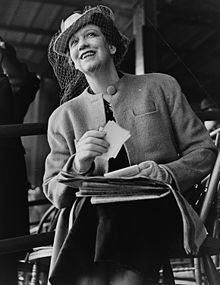 Elizabeth Arden, Florence Nightingale Graham (December 31, 1878 – October 18, 1966), who went by the business name Elizabeth Arden, was a Canadian American businesswoman who founded what is now Elizabeth Arden, Inc., and built a cosmetics empire in the United States. At the peak of her career, she was one of the wealthiest women in the world.
Elizabeth Arden, Florence Nightingale Graham (December 31, 1878 – October 18, 1966), who went by the business name Elizabeth Arden, was a Canadian American businesswoman who founded what is now Elizabeth Arden, Inc., and built a cosmetics empire in the United States. At the peak of her career, she was one of the wealthiest women in the world.
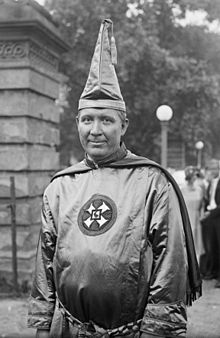 Hiram Wesley Evans (September 26, 1881 – September 14, 1966) was Imperial Wizard of the Ku Klux Klan, an American white supremacist group, from 1922 to 1939. A native of Alabama, Evans attended Vanderbilt University and became a dentist. He operated a small, moderately successful practice in Texas until 1920, when he joined the Klan's Dallas chapter. He quickly rose through the ranks and was part of a group that ousted William Joseph Simmons from the position of Imperial Wizard, the national leader, in November 1922. Evans succeeded him and sought to transform the group into a political power. Evans presided over the largest Klan gathering in history, attended by over 200,000, and endorsed several successful candidates in 1924 elections.
Hiram Wesley Evans (September 26, 1881 – September 14, 1966) was Imperial Wizard of the Ku Klux Klan, an American white supremacist group, from 1922 to 1939. A native of Alabama, Evans attended Vanderbilt University and became a dentist. He operated a small, moderately successful practice in Texas until 1920, when he joined the Klan's Dallas chapter. He quickly rose through the ranks and was part of a group that ousted William Joseph Simmons from the position of Imperial Wizard, the national leader, in November 1922. Evans succeeded him and sought to transform the group into a political power. Evans presided over the largest Klan gathering in history, attended by over 200,000, and endorsed several successful candidates in 1924 elections.
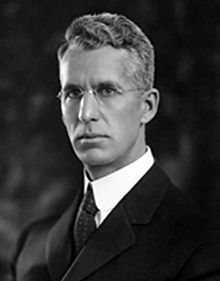 Albert Wallace Hull (19 April 1880 – 22 January 1966) is an American physicist and electrical engineer who made contributions to the development of vacuum tubes, and invented the magnetron. He was a member of the National Academy of Sciences.
Albert Wallace Hull (19 April 1880 – 22 January 1966) is an American physicist and electrical engineer who made contributions to the development of vacuum tubes, and invented the magnetron. He was a member of the National Academy of Sciences.
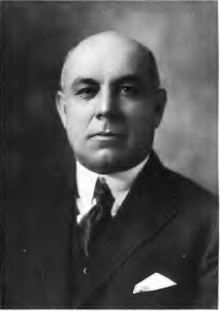 S. S. Kresge, Sebastian Spering Kresge (July 31, 1867 – October 18, 1966), was an American businessman and was the founder of the S. S. Kresge Company, one of the 20th century's largest retail organizations. The company was renamed the Kmart Corporation in 1977, and evolved into today's Sears Holdings Corporation, parent of Kmart and Sears.
S. S. Kresge, Sebastian Spering Kresge (July 31, 1867 – October 18, 1966), was an American businessman and was the founder of the S. S. Kresge Company, one of the 20th century's largest retail organizations. The company was renamed the Kmart Corporation in 1977, and evolved into today's Sears Holdings Corporation, parent of Kmart and Sears.
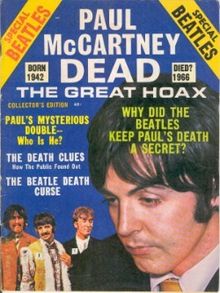 Paul McCartney, "Paul is dead" is an urban legend and conspiracy theory suggesting that Paul McCartney of the English rock band the Beatles died in 1966 and was secretly replaced by a look-alike. Various clues were used to suggest the following story: three years previously (on 9 November 1966), McCartney, after an argument during a Beatles' recording session, had angrily driven off in his car. He had crashed it and died as a result. To spare the public from grief, the Beatles replaced him with "William Campbell", the winner of a McCartney look-alike contest. Hundreds of supposed clues to McCartney's death have been reported by fans and followers of the legend. These include messages perceived when listening to a song being played backwards, and symbolic interpretations of both lyrics and album cover imagery.
Paul McCartney, "Paul is dead" is an urban legend and conspiracy theory suggesting that Paul McCartney of the English rock band the Beatles died in 1966 and was secretly replaced by a look-alike. Various clues were used to suggest the following story: three years previously (on 9 November 1966), McCartney, after an argument during a Beatles' recording session, had angrily driven off in his car. He had crashed it and died as a result. To spare the public from grief, the Beatles replaced him with "William Campbell", the winner of a McCartney look-alike contest. Hundreds of supposed clues to McCartney's death have been reported by fans and followers of the legend. These include messages perceived when listening to a song being played backwards, and symbolic interpretations of both lyrics and album cover imagery.
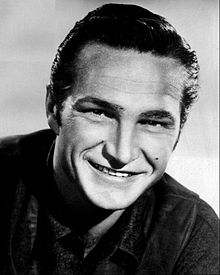 Eric Fleming (born Edward Heddy, Jr.; July 4, 1925 – September 28, 1966) was an American actor, known primarily for his role as Gil Favor in the long-running CBS television series Rawhide.
Eric Fleming (born Edward Heddy, Jr.; July 4, 1925 – September 28, 1966) was an American actor, known primarily for his role as Gil Favor in the long-running CBS television series Rawhide.
